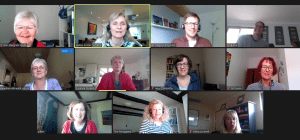Eight members of the Reable network met during the Nordic Gerontology Congress in Stockholm June 12-15- 2024. Many of them had oral or poster presentations of their respective reablement projects. From left to right: Marianne Eliassen, Silke Metzelthin, Magnus Zingmark, Hanne Tuntland, Ines Mouchaers, Lise Buma, Susanne Assander and Aileen Bergstrøm.

From right to left: Jackie Pool, Hanne Tuntland, Jette Thuesen, Linda Clare, Erik Rosendal, Maud Graff, Miia Rahja, Silke Metzelthin, Magnus Zingmark and Marjolein de Vugt.

Establishment of ReableDem
ReableDem is a newly established network deriving from the Reable network. ReableDem is a network and evidence-based knowledge base for person-centred reablement in dementia care financed by the JPND Joint EU call. The network consists of 14 members (Silke Metzelthin, Jette Thuesen, Magnus Zingmark, Hanne Tuntland, Christoffer Poulos, Yun-Hee Jeon, Lee-Fay Low, Miia Rahja, Clarissa Giebel, Jacki Pool, Linda Clare, Marjolein de Vugt, Hanne Kaae Kristensen, and Erik Rosendahl) from 6 countries (Australia, Denmark, Norway, Sweden, the Netherlands and United Kingdom). It is a one-year project aiming for, among other issues, to exchange most recent evidence regarding reablement for people living with dementia and produce a) a position paper and b) a catalogue of effective reablement models for PLWD that guide reablement research and practice in dementia care. The first face-to-face meeting was held in Copenhagen October 5.-6., 2023.

Book release
On February 2, 2023 26 of the Reable network members participated in a book release webinar to celebrate the publication of Reablement in Long-Term Care for Older People: International Perspectives and Future Directions. this book, edited by Tine Rostgaard, John Parsons and Hanne Tuntland contains chapters written by members of the Network. Details can be found here.

Systematic review of Reablement
Lisa Buma and colleagues from Maastricht University have published a systematic review which provides a current overview of reablement services across the world according to the recently published ReAble definition and their effect on Activities of Daily Living (ADL) and their effects on daily functioning. In addition, the most common and possibly promising features of reablement interventions were identified, which can provide guidance when developing future reablement interventions. The presentation can be found here
Presentation ReAble review_Lise Buma
Recent Reable News in Australia – April 2021
In early 2021 The Australian Government, Department of Health released a range of online initiatives and resources to help Commonwealth Home Support Programme (CHSP) service providers embed wellness and reablement approaches into their organisational practices and service delivery.
These resources include:
- A collection of practical guides and tools including:
- change management templates
- care planning check list
- organisational culture check list
- principles for goal setting and an
- organisational self-assessment amongst others.
The tools can be accessed through the following link
https://www.health.gov.au/resources/collections/wellness-and-reablement-resources
- The launch of a Wellness and Reablement Community of Practice – where CHSP service providers can share ideas and stories, seek feedback and support each other with developing and embedding wellness and reablement approaches. The site called ‘more good days’ is available only to CHSP providers and can be accessed through the following link. https://www.more-good-days.com.au/login
- On line training modules which will support the CHSP workforce to learn about wellness and reablement and how to embed into everyday service delivery approaches. The eLearning modules are available on the Australian governments My Aged Care Learning Environment (MACLE).
The modules cover a range of topics including:
- Foundations in wellness and reablement
- Wellness and reablement in practice
- Reablement planning and strategy development
In addition, a facilitators tool kit for CHSP providers is available to organisations with capacity and infrastructure to deliver the training in house.
- A podcast series. The podcasts supplement the eLearning modules and can also be listened to on their own. The eleven podcasts aim to promote the value and benefits of adopting a wellness and reablement approach, and the benefits to older people being supported by organisations. The podcasts can be accessed at wellness and reablement podcasts.
A definition for reablement – September 2020
Metzelthin et al (2020) have published a position paper presenting an internationally accepted definition of reablement. The work was initiated by the Reable network and written by four of it`s members. This is the definition:
Reablement is a person-centred, holistic approach that aims to enhance an individual’s physical and/or other functioning, to increase or maintain their independence in meaningful activities of daily living at their place of residence and to reduce their need for long-term services. Reablement consists of multiple visits and is delivered by a trained and coordinated interdisciplinary team. The approach includes an initial comprehensive assessment followed by regular reassessments and the development of goal-oriented support plans. Reablement supports an individual to achieve their goals, if applicable, through participation in daily activities, home modifications and assistive devices as well as involvement of their social network. Reablement is an inclusive approach irrespective of age, capacity, diagnosis or setting.
Metzelthin, S. F., Rostgaard, T., Parsons, M., & Burton, E. (2020). Development of an internationally accepted definition of reablement: a Delphi study. Ageing & Society, 1-16.
https://cpb-ap-se2.wpmucdn.com/blogs.auckland.ac.nz/dist/3/386/files/2020/09/Metzelthin-et-2020.pdf
New AAG Position Paper promotes understanding of the core principles of wellness and reablement – August 2020
On 31 July 2020, AAG published its Position Paper: Wellness and reablement for all Australians receiving home, community and residential aged care services.
This paper is the culmination of three years’ of collaborative work and background research supported by AAG’s Reablement Expert Reference Group members who represent a range of professions, aged care service areas, professionals bodies and service providers.
The aim of this Position Paper is to provide clear direction to the Australian Government, policymakers and service providers on the core principles of wellness and reablement in aged care that must be upheld in order to meet the needs, strengths and preferences of Australians as they age. It is not intended to provide detailed guidance on specific wellness and reablement approaches or to advocate for specific funding models or service delivery approaches, but rather to contribute to shared understanding of core principles.
Access the Position Paper, read more about AAG’s Reablement Expert Reference Group, as well as access the background work and evidence that informed this paper here on AAG’s website.
Coming book publication – update June 2020
We are very happy that Policy Press has accepted to publish our coming book: Reablement – a new approach to sustainability and person- centeredness in long-term care for older people. Tine Rostgaard is the editor of the book and at least 25 authors are contributing, most of them from our network.
One of the peer reviewers wrote the following : “The proposed book is quite original in its conception and scope. It will provide a useful review of the literature and help develop theory and understanding of the drive for, and limitations of, reablement. Most importantly, however, it brings together a two important perspectives that are commonly kept quite separate – that of practitioners and health advocates who understand its implications for clinical practice and individual wellbeing, and that of policy analysts, policy makers and social researchers concerned with issues of the political possibilities and constraints on service delivery for this increasing demographic”.
And this: “In fact the suggested structure is better than just being logical and clear. It is revelatory and original. I think it does bring a fresh internationally comparative approach to bear – enhanced by ensuring that international teams of authors work together in inter-country comparisons in chapters dealing with a single conceptual topic, rather then the topics being arranged more conventionally into a separate chapter for each country”.
May 2020 Webinar
The ReAble network frequently arranges webinars for members regarding discussions of various topics related to reablement. This is a picture of the recent Zoom meeting in May 2020. The main discussion this time regarded how the COVID-19 pandemic affects the reablement services in our countries.
Recent activity for the ReAble network includes:
Workshop in Copenhagen
A total of 18 researchers from the ReAble network had a fruitful workshop in Copenhagen 26-27th of June 2019. The agenda for the workshop was continuous work with a planned scientific anthology and special issues in two journals

